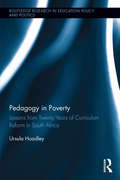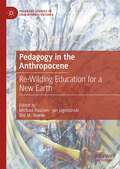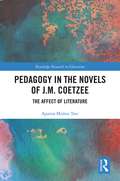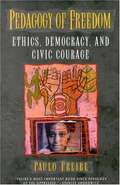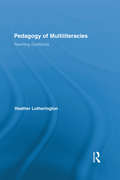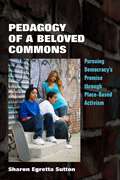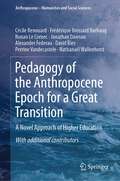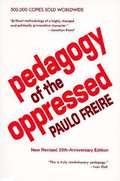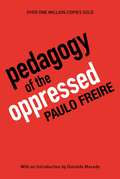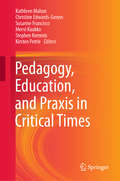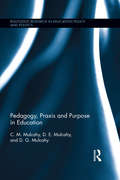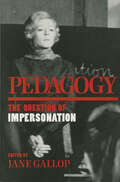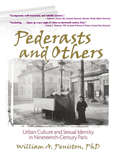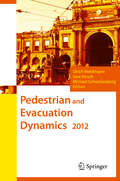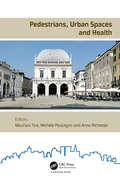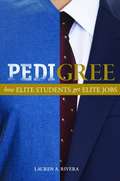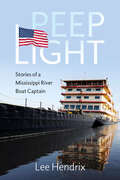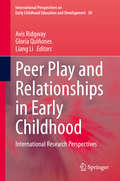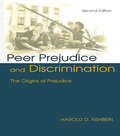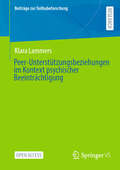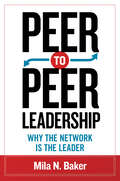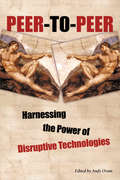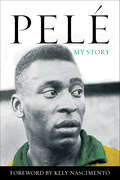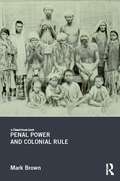- Table View
- List View
Pedagogy in Higher Education
by Anne Edwards Gordon WellsWhat can Cultural Historical Activity Theory (CHAT) contribute to the solution of the problems facing higher education today? This edited volume brings together the work of an international group of scholars and researchers to address this important question. Drawing on contemporary interpretations of CHAT, the contributors take on a wide range of issues, ranging from pedagogy to administration and from teacher preparation to university outreach. An introduction presents the key principles of CHAT. Subsequent chapters address such issues as effective ways of teaching large undergraduate classes, providing support for struggling writers or for students with disabilities, opening up opportunities for students from historically underserved communities, preparing students for the professions, and building bridges between higher education and the wider community. Readers with an interest in higher education will encounter ideas in these chapters that will prompt them to rethink their role in preparing today's students for tomorrow's challenges.
Pedagogy in Poverty: Lessons from Twenty Years of Curriculum Reform in South Africa (Routledge Research in Education Policy and Politics)
by Ursula HoadleyAs South Africa transitioned from apartheid to democracy, changes in the political landscape, as well as educational agendas and discourse on both a national and international level, shaped successive waves of curriculum reform over a relatively short period of time. Using South Africa as a germane example of how curriculum and pedagogy can interact and affect educational outcomes, Pedagogy in Poverty explores the potential of curricula to improve education in developing and emerging economies worldwide, and, ultimately, to reduce inequality. Incorporating detailed, empirical accounts of life inside South African classrooms, this book is a much-needed contribution to international debate surrounding optimal curriculum and pedagogic forms for children in poor schools. Classroom-level responses to curriculum policy reforms reveal some implications of the shifts between a radical, progressive approach and traditional curriculum forms. Hoadley focuses on the crucial role of teachers as mediators between curriculum and pedagogy, and explores key issues related to teacher knowledge by examining the teaching of reading and numeracy at the foundational levels of schooling. Offering a data-rich historical sociology of curriculum and pedagogic change, this book will appeal to academics, researchers and postgraduate students in the fields of education, sociology of education, curriculum studies, educational equality and school reform, and the policy and politics of education.
Pedagogy in the Anthropocene: Re-Wilding Education for a New Earth (Palgrave Studies in Educational Futures)
by Jan Jagodzinski Michael Paulsen Shé M. HawkeThis book explores new pedagogical challenges and potentials of the Anthropocene era. The authors argue that this new epoch, with an unstable climate, new kinds of globally spreading viruses, and new knowledges, calls for a new way of educating and an alertness to new philosophies of education and pedagogical imaginations, thoughts, and practices. Addressing the linkages between the Anthropocene and Pedagogy across a broad pedagogical spectrum that is both formal and informal, the editors and their contributors emphasize a re-imagining of education that serves to deepen our understanding of the capacities and values of life.
Pedagogy in the Novels of J.M. Coetzee: The Affect of Literature (Routledge Research in Education)
by Aparna Mishra TarcCritically analyzing the representation of pedagogy in the novels of J.M. Coetzee, this insightful text illustrates the author’s profound conception of learning and personal development as something which takes place well beyond formal education. Bringing together critical and educational theory, Pedagogy in the Novels of J.M. Coetzee examines depictions of pedagogy in novels including Age of Iron, Elizabeth Costello, Disgrace, and Childhood of Jesus. Engaging with Coetzee’s varied literary use of pedagogical themes such as motherhood, maternal love, and the importance of childhood interactions, reading, and experiences, chapters demonstrate how Coetzee foregrounds pedagogy as intrinsic to the formation of human actors, society, and civilization. The text thereby aptly explores and broadens our understanding of education - what it is, what it achieves, and how it can affect and shape human existence. This text will be of great interest to graduate and postgraduate students, academics, researchers and professionals in the fields of pedagogy, postcolonial studies, educational theory and philosophy, and English literature.
Pedagogy of Freedom: Ethics, Democracy And Civic Courage
by Paulo Freire Patrick ClarkeThis book displays the striking creativity and profound insight that characterized Freire's work to the very end of his life-an uplifting and provocative exploration not only for educators, but also for all that learn and live.
Pedagogy of Multiliteracies: Rewriting Goldilocks (Routledge Research in Education)
by Heather LotheringtonA CHOICE Outstanding Academic Title 2012! Based on case studies from public schools in Toronto, Canada, this book chronicles an inspiring five-year journey to develop thinking about and teaching literacy for the 21st century. The research, which was classroom-based and developed by public school teachers in collaboration with university researchers, was stimulated by an ethnographic study at Joyce Public School to track children learning to read in an era of multiliteracies. Following the kindergarteners’ interest in Goldilocks and the Three Bears, Lotherington asked the principal: What would Goldilocks look like, retold through the eyes of the children? The resulting classroom experiment to transform learning to read a storybook into multimodal collaborative story-telling sparked the development of an award-winning school-university learning community dedicated to the development of multimodal literacies in the culturally diverse, urban classroom. Pedagogy of Multiliteracies tells the evolving story of teachers’ trial-and-error interventions to engage children in multiple modes of expression involving structured play with contemporary media. Using the complex texts created, the teachers carve spaces to welcome the voices of children and the languages of the community into the English-medium classroom.
Pedagogy of a Beloved Commons: Pursuing Democracy’s Promise through Place-Based Activism (Polis: Fordham Series in Urban Studies)
by Sharon Egretta SuttonA rare and powerful illustration of what it takes to become a sustainable, community-embedded organization that continually grows the next generation of compassionate leaders.This essential, timely book meets us at our current moment of crisis to offer hope that American democracy’s stalled trajectory toward its founding creed to embrace all, and not just some, can indeed be re-invigorated. Pedagogy of a Beloved Commons is about low-income youth of color working within justice-oriented, community-based organizations to improve the social and spatial conditions in their surroundings. It draws from hundreds of pages of data, some collected over a decade ago by graduate research assistants at three universities and some collected recently by a graduate research assistant at a fourth university, to present verbatim quotes from interviews with constituents of three youth-serving organizations. The book posits that the disinvested neighborhoods where youth experience abandonment and marginality in fact can serve as a call to action, given appropriate organizational support.Pedagogy of a Beloved Commons envisions a place-based critical pedagogy that can provide young people with the practical skills and deep values to engage with today’s economic, racial, and ecological crises. It offers a welcome antidote to a neoliberal education system that has not only veered away from its public mandate to advance democratic citizenship but that has also reinforced today’s insidious economic inequality, rendering illusive the idea that rich and poor can work together toward a common good. Between these pages resonates a passionate call for an approach to cultivating citizens who have the critical skills to challenge injustice, the courage to hold the rich and powerful accountable, and the empathy to advance not just their own self-interest but also the health and well-being of their communities and the planet. The author proposes that such citizens develop by exercising collective agency in “the commons,” a political and psychic space whose values are mapped out in physical space. Through the expert use of an architect’s lens, this groundbreaking book argues that the three-dimensional concreteness of the nation’s disinvested neighborhoods provides a virtual stage where disenfranchised youth can experiment with collective life, become more discerning about the forces that have shaped their communities, and practice working toward just and inclusive futures.Merging Paolo Freire’s seminal theory of critical pedagogy with Grace Lee Boggs’s belief that hands-on community-building can disrupt the ever more destructive forces of neoliberal capitalism, Pedagogy of a Beloved Commons refines an aspirational framework for a pathway forward through a careful analysis of three exemplar organizations. It offers rich, unique portraits of young people transforming their communities in southwest Detroit, Wai’anae, and Harlem, respectively illustrating place-based activism through theater, organic farming, and critical inquiry. Here activism is framed as the hands-on engagement of youth in addressing inequities in the commons of their neighborhoods through small but persistent interventions that also help them learn the language of solidarity and collectivity that a sustainable democracy needs. Pedagogy of a Beloved Commons is a must-read for our times and for our future.
Pedagogy of the Anthropocene Epoch for a Great Transition: A Novel Approach of Higher Education (Anthropocene – Humanities and Social Sciences)
by Jonathan Dawson Nathanaël Wallenhorst Cécile Renouard Frédérique Brossard Børhaug Ronan Le Cornec Alexander Federau David Ries Perrine VandecasteleThis book functions as a practical guide to support teachers and higher education institutions in the construction of their courses and programmes in light of the Anthropocene. It is divided into two complementary parts. The first part lays the theoretical foundations of what is a transition pedagogy and provides a pedagogical framework. It offers practical tools and didactic levers to be used by teachers and institutions to build a truly transformative pedagogy for students, with reference to universities already experimenting such alternative methods. The second part presents an analysis of the pedagogical tools and levers experienced in worldwide institutions, by teachers, as well as philosophers and experts of pedagogy. The authors of this book advocate for an embodied pedagogy which not only gives students access to content but also to ways of thinking and acting in all conscience. A pedagogy of the Anthropocene epoch therefore encourages the mobilization of reason, emotions and senses as well as systemic reflection in the questioning of our lifestyles and the development of transversal skills. Based on internationally recognized research and practical experiences of institutions and teachers all over the western world, this book gathers the knowledge and experience of professors and researchers, coming from a wide variety of disciplines and cultural context. Their reflections have led them to develop a “head-heart-body approach” and a “6 Gates questioning method” to remodel pedagogy. This book is of interest to those working in the education sector.
Pedagogy of the Oppressed
by Myra Bergman Ramos Paulo FreirePaulo Freire has perfected a method for teaching illiterates that has contributed, in an extraordinary way, to that process. In fact, those who, in learning to read and write, come to a new awareness of selfhood and begin to look critically at the social situation in which they find themselves, often take the initiative in acting to transform the society that has denied them this opportunity of participation. Education is once again a subversive force.
Pedagogy of the Oppressed
by Paulo FreireThe methodology of the late Paulo Freire has helped to empower countless impoverished and illiterate people throughout the world. Freire's work has taken on especial urgency in the United States and Western Europe, where the creation of a permanent underclass among the underprivileged and minorities in cities and urban centers is increasingly accepted as the norm.
Pedagogy, Education, and Praxis in Critical Times
by Stephen Kemmis Christine Edwards-Groves Kathleen Mahon Susanne Francisco Kirsten Petrie Mervi KaukkoThis book critically explores urgent questions that researchers, educators, and policy makers need to consider and address in order to better our understanding and capacity to transform education. Focusing on areas that underpin the empirical, theoretical, and strategic research of the Pedagogy, Education and Praxis (PEP) International Research Network, it discusses the following topics: the nature of educational praxis; research approaches that facilitate praxis and praxis development; changing cultural, social, political and material conditions affecting the educational practices of teachers; and how good professional practice in teaching, leading, and professional learning are understood and experienced. Presenting findings emerging from the Pedagogy, Education and Praxis research, the book raises new questions and offers new ways of thinking about the identified issues and themes in light of current educational concerns and the prevalence of neoliberal conditions being experienced in educational settings around the globe. It provides supporting evidence and illustrative examples to help readers understand important concepts, situations, and concerns, and brings together intellectual and cultural-historical traditions that, when considered in relation to each other, open up critical opportunities and ideas orienting readers towards future educational transformation.
Pedagogy, Praxis and Purpose in Education (Routledge Research in Education Policy and Politics)
by C.M. Mulcahy D.E. Mulcahy D.G. MulcahyRecent years have shown the growth of federal legislation and programs having a profound impact on educational policy and practice, and a decline in reliance on broadly based educational justifications. Paralleling this development has been the emergence of well-endowed and influential private foundations, and an increase in corporate influence in shaping policy. In this volume the authors consider the discourse, rhetoric, and underlying values that sustain these developments alongside those that underlie more longstanding and competing educational theories and practices. This volume highlights the importance of recognizing opposing conceptualizations of education—some more educationally productive than others— and their core values, approaches to student learning, strengths and weaknesses, and justification. The authors analyze and critique what Jane Roland Martin has referred to as ‘the deep structure of educational thought’, and seek improved educational policy and practice with particular reference to curriculum and pedagogy. It features a comparative analysis of competing discourses including autocratic control, limited personal development, and praxis.
Pedagogy: The Question of Impersonation
by Jane GallopIn this anthology, teachers and scholars examine the ways in which teaching is a performance that incorporates acts of impersonation.Drawn from a conference on classroom dynamics, this anthology explores both the personal and performative aspects of teacher-student relationships. After David Crane’s prefatory “postscript,” George Otte recommends that students pretend, writing from various perspectives; Indira Karamcheti suggests putting on race as one can put on gender roles. Cheryl Johnson gets personal by playing the “trickster,” and Chris Amirault explores the relationship between the teacher and “the good student.”While Karamcheti, Gallop, and Lynne Joyrich use theatrical vehicles to structure their essays, Joseph Litvak, Arthur W. Frank, and Naomi Scheman incorporate performance as examples. Madeleine R. Grumet theorizes pedagogy, while Roger I. Simon suggests that pedagogical roles can be taken on and off at will; Gregory Jay discusses the ethical side of impersonation; and Susan Miller denounces “the personal” as a sham.
Pederasts and Others: Urban Culture and Sexual Identity in Nineteenth-Century Paris
by William PenistonExamine how a community of support in Nineteenth-Century Paris became a blueprint for modern sexual identity! A unique social history, Pederasts and Others: Urban Culture and Sexual Identity in Nineteenth-Century Paris is a valuable addition to the growing field of gay and lesbian studies. The book examines the interaction between the city's male homosexual subculture and Parisian authority figures who attempted to maintain political and social order during the early years of the French Third Republic by using laws against public indecency and sexual assault to treat same-sex sexuality as a crime. Faced with a constant cycle of surveillance, harassment, and arrest, the city's gay men survived the hostile urban environment by forming a community of support that had a widespread and lasting influence on the development of modern sexual identities. Pederasts and Others: Urban Culture and Sexual Identity in Nineteenth-Century Paris is based on a statistical analysis of more than 800 working-class and middle-class men who were arrested or investigated by Parisian police between 1873 and 1879. Their stories, presented through long and short case studies, represent nearly 2,000 names recorded by police in "Pederasts and Others," a ledger detailing the arrests of male homosexuals for public offenses against decency and other minor offenses. (The term "pederast" identified those suspected of same-sex sexual activity, not the modern definition that indicates homosexual relations with a minor.) The ledger entries reveal specific habits, attitudes, values, and characteristics about these men that set them apart-the same traits that identified them as part of a community based on their behavior and relationships. Pederasts and Others: Urban Culture and Sexual Identity in Nineteenth-Century Paris examines: the forces of authority the laws regarding same-sex sexual behavior the role of the police the role of the magistrates the role of the doctors the common characteristics of the city's male homosexual subculture the sexual behaviors of the Paris underground the geography of the subculture and takes an expanded look at three case studies: "A Decadent Aristocrat and A Delinquent Boy" "Pederasts, Prostitutes, and Pickpockets" "Love and Death in Gay Paris" Pederasts and Others: Urban Culture and Sexual Identity in Nineteenth-Century Paris also includes tables, appendices, and maps linked to statistical data. The book is an essential resource for historians, sociologists, sexologists, criminologists, and other scholars working in the fields of gay and lesbian studies, urban studies, social and cultural history, and French history.
Pedestrian and Evacuation Dynamics 2012
by Michael Schreckenberg Ulrich Weidmann Uwe KirschThe 6th International Conference on Pedestrian and Evacuation Dynamics (PED2012) showcased research on human locomotion. This book presents the proceedings of PED2012. Humans have walked for eons; our drive to settle the globe began with a walk out of Africa. However, much remains to discover. As the world moves toward sustainability while racing to assess and accommodate climate change, research must provide insight on the physical requirements of walking, the dynamics of pedestrians on the move and more. We must understand, predict and simulate pedestrian behaviour, to avoid dangerous situations, to plan for emergencies, and not least, to make walking more attractive and enjoyable. PED2012 offered 70 presentations and keynote talks as well as 70 poster presentations covering new and improved mathematical models, describing new insights on pedestrian behaviour in normal and emergency cases and presenting research based on sensors and advanced observation methods. These papers offer a starting point for innovative new research, building a strong foundation for the next conference and for future research.
Pedestrians, Urban Spaces and Health: Proceedings of the XXIV International Conference on Living and Walking in Cities (LWC, September 12-13, 2019, Brescia, Italy)
by Maurizio TiraToday, citizens advocate greater environmental sustainability, better services and the improvement of urban quality by promoting safer mobility and health. Addressing these issues, Pedestrians, Urban spaces and Health contains the papers presented at the XXIV International Conference "Living and Walking in Cities" (Brescia, Italy, 12-13 September 2019). The contributions discuss town planning issues, look at best practices and research findings across the broad spectrum of urban and transport planning, with particular attention to the safety of pedestrians in the city. The main topics of the book are: Walking experiences Urban spaces and Redevelopment Healthy cities (as Urban resilience and for Weakest users) Pedestrians, Urban spaces and Health is a powerful plea for a multi-disciplinary and comprehensive approach to urban mobility and planning, and will be of interest to academics, consultants and practitioners interested in these areas.
Pedigree
by Lauren A. RiveraAmericans are taught to believe that upward mobility is possible for anyone who is willing to work hard, regardless of their social status, yet it is often those from affluent backgrounds who land the best jobs. Pedigree takes readers behind the closed doors of top-tier investment banks, consulting firms, and law firms to reveal the truth about who really gets hired for the nation's highest-paying entry-level jobs, who doesn't, and why.Drawing on scores of in-depth interviews as well as firsthand observation of hiring practices at some of America's most prestigious firms, Lauren Rivera shows how, at every step of the hiring process, the ways that employers define and evaluate merit are strongly skewed to favor job applicants from economically privileged backgrounds. She reveals how decision makers draw from ideas about talent--what it is, what best signals it, and who does (and does not) have it--that are deeply rooted in social class. Displaying the "right stuff" that elite employers are looking for entails considerable amounts of economic, social, and cultural resources on the part of the applicants and their parents.Challenging our most cherished beliefs about college as a great equalizer and the job market as a level playing field, Pedigree exposes the class biases built into American notions about the best and the brightest, and shows how social status plays a significant role in determining who reaches the top of the economic ladder.
Peep Light: Stories of a Mississippi River Boat Captain
by Lee HendrixMost people only consider the Mississippi River when they cross it or when it inconveniently abandons its banks. But every year, millions of tons of cargo are transported by towboats on the river. In Peep Light: Stories of a Mississippi River Boat Captain, Captain Lee Hendrix provides unique insight on people who work and live on and near the Mississippi River. Hendrix, formerly a pilot for the Delta Queen Steamboat Co., has worked on the Mississippi for fifty years, first as a towboat deckhand in 1972 and eventually as a pilot of towboats and passenger vessels. In 2014, Hendrix became captain of the towboat Mississippi with the US Army Corps of Engineers, then he later retired to return to passenger vessels. For Hendrix and others like him, he is at home on the river, living and dining with the same people they work with, working with familiar faces for years at a time and yet meeting new people every day.Demonstrating a fascination not only with the river but also with the passions and dreams of those who live and work on it, these stories range from personal reflections on aging, experiencing one’s first night on the river and the complex emotions that come with it, working on the deck, promotion to pilot, the characters working aboard these boats, and the history of the river itself. Peep Light unites humans with the river through engaging storytelling and sheds light on Hendrix’s rare experience along one of the most powerful and important waterways in the world.
Peer Play and Relationships in Early Childhood: International Research Perspectives (International Perspectives on Early Childhood Education and Development #30)
by Avis Ridgway Gloria Quiñones Liang LiThis book offers a rich collection of international research narratives that reveal the qualities and value of peer play. It presents new understandings of peer play and relationships in chapters drawn from richly varied contexts that involve sibling play, collaborative peer play, and joint play with adults. The book explores social strategies such as cooperation, negotiation, playing with rules, expressing empathy, and sharing imaginary emotional peer play experiences. Its reconceptualization of peer play and relationships promotes new thinking on children's development in contemporary worlds. It shows how new knowledge generated about young children's play with peers illuminates how they learn and develop within and across communities, families, and educational settings in diverse cultural contexts. The book addresses issues that are relevant for parents, early years' professionals and academics, including the role of play in learning at school, the role of adults in self-initiated play, and the long-term impact of early friendships. The book makes clear how recent cultural differences involve digital, engineering and imaginary peer play. The book follows a clear line of argument highlighting the importance of play-based learning and stress the importance of further knowledge of children's interaction in their context. This book aims to highlight the narration of peer play, mostly leaning on a sociocultural theoretical perspective, where many chapters have a cultural-historical theoretical frame and highlight children's social situation of development. Polly Björk-Willén, Linköping University, Sweden
Peer Prejudice and Discrimination: The Origins of Prejudice
by Harold D. FishbeinThis award-winning book provides an analysis of the genetic/evolutionary, cultural/historical, and developmental aspects of prejudice and discrimination. It emphasizes how certain genetic/evolutionary mechanisms are utilized to both produce and prevent prejudice and discrimination from occurring or to modify these behaviors once established. The goals of the book are to help us understand the limitations of interventions and increase tolerance and acceptance of outsiders. Peer Prejudice and Discrimination, Second Edition is ideal for advanced-level courses on prejudice and/or discrimination taught in departments of psychology, education, and sociology, as well as a valuable addition to any serious scholars personal library.
Peer-Unterstützungsbeziehungen im Kontext psychischer Beeinträchtigung (Beiträge zur Teilhabeforschung)
by Klara LammersDieses Open-Access-Buch schafft durch ein qualitatives Forschungsvorgehen im Sinne der Grounded Theory Methodologie einen empirischen Zugang zur Perspektive von Peer-Begleiter*innen auf Unterstützungsangebote im Kontext psychischer Beeinträchtigung. Im Fokus der in diesem Zuge entwickelten gegenstandsverankerten Theorie steht die Peer-Beziehung zwischen Peer-Begleiter*innen und Nutzer*innen als spezifische Ausprägung einer Unterstützungsbeziehung. Die Ergebnisse dieser Arbeit deuten darauf hin, dass diese als komplexe Form der Beziehungsgestaltung verstanden werden kann, da sie von einer Gleichzeitigkeit drei unterschiedlicher Positionierungen der Peer-Begleiter*innen gegenüber den Nutzer*innen geprägt ist: erstens als Selbst-Betroffene, zweitens als Unterstützer*innen und drittens als organisationale Akteur*innen. Aus dem Zusammenwirken dieser Aspekte resultierende Spannungsfelder kennzeichnen die entstehenden Peer-Beziehungen und stellen die Anforderung an Peer-Begleiter*innen, im praktischen Handeln einen Umgang damit zu finden.
Peer-to-Peer Leadership: Why the Network Is the Leader
by Mila N. BakerOur leadership models are stuck in an Industrial Age, top-down mentality. But in our complex, data-drenched, 24/7 world, there is simply too much information coming from too many different directions too quickly for any one leader or group to stay on top of it. Hierarchy is breaking down everywhere—why should leadership be any different? Inspired by the peer-to-peer model of computing used in social networking and crowdsource technologies, Mila Baker shows a new way to lead. Organizations, she says, must become networks of "equipotent" nodes of power—peer leaders. The job of the leader is now to set the overall goals and direction and optimize the health of that network, not tell it what to do. In these organizations, leadership roles shift rapidly to fit the needs of any given situation. Information flows freely so those who need it can find it easily and act on it immediately. Feedback becomes an organic part of the workflow, enabling rapid course corrections. Baker shows how companies like Gore and Herman Miller have achieved long-term success practicing these principles and provides a structure that any organization can adapt to build flexibility, resiliency, and accountability.
Peer-to-Peer: Harnessing the Power of Disruptive Technologies
by Andy OramThe term "peer-to-peer" has come to be applied to networks that expect end users to contribute their own files, computing time, or other resources to some shared project. Even more interesting than the systems' technical underpinnings are their socially disruptive potential: in various ways they return content, choice, and control to ordinary users.While this book is mostly about the technical promise of peer-to-peer, we also talk about its exciting social promise. Communities have been forming on the Internet for a long time, but they have been limited by the flat interactive qualities of email and Network newsgroups. People can exchange recommendations and ideas over these media, but have great difficulty commenting on each other's postings, structuring information, performing searches, or creating summaries. If tools provided ways to organize information intelligently, and if each person could serve up his or her own data and retrieve others' data, the possibilities for collaboration would take off. Peer-to-peer technologies along with metadata could enhance almost any group of people who share an interest--technical, cultural, political, medical, you name it.This book presents the goals that drive the developers of the best-known peer-to-peer systems, the problems they've faced, and the technical solutions they've found. Learn here the essentials of peer-to-peer from leaders of the field:Nelson Minar and Marc Hedlund of target="new">Popular Power, on a history of peer-to-peerClay Shirky of acceleratorgroup, on where peer-to-peer is likely to be headedTim O'Reilly of O'Reilly & Associates, on redefining the public's perceptionsDan Bricklin, cocreator of Visicalc, on harvesting information from end-usersDavid Anderson of SETI@home, on how SETI@Home created the world's largest computerJeremie Miller of Jabber, on the Internet as a collection of conversationsGene Kan of Gnutella and GoneSilent.com, on lessons from Gnutella for peer-to-peer technologiesAdam Langley of Freenet, on Freenet's present and upcoming architectureAlan Brown of Red Rover, on a deliberately low-tech content distribution systemMarc Waldman, Lorrie Cranor, and Avi Rubin of AT&T Labs, on the Publius project and trust in distributed systemsRoger Dingledine, Michael J. Freedman, andDavid Molnar of Free Haven, on resource allocation and accountability in distributed systemsRael Dornfest of O'Reilly Network and Dan Brickley of ILRT/RDF Web, on metadataTheodore Hong of Freenet, on performanceRichard Lethin of Reputation Technologies, on how reputation can be built onlineJon Udell ofBYTE and
Pelé: My Story
by Pelé"For an American soccer kid growing up in the ‘80s, Pelé transcended the game. From the moment I first saw him standing next to Sylvester Stallone and Michael Caine in Victory, there was only one star for me on that screen. Pelé's exciting memoir revives all the groundbreaking moments of the best there ever was." —Alexi Lalas, journalist, retired professional US soccer player The man. The legend. The autobiography. Even people who don’t know soccer know Pelé, the universally acknowledged best player of all time. Born Edson Arantes do Nascimento, “Pelé” was the youngest player to score a goal in and win the World Cup at age seventeen, the only player to win the World Cup three times, and the all-time goal scorer for Brazil. His international career helped introduce soccer to Americans, and he popularized describing the sport as “the beautiful game.” But how did this man become a global icon? In Pelé: My Story, Pelé shares in his own words the story of his incredible life and career. Told with his characteristic charm and humility, and covering all aspects of his playing days and his subsequent careers as politician, international sporting ambassador, and cultural icon, this book is the essential volume for all sports fans, and anyone who admires true rarity of spirit.
Penal Power and Colonial Rule
by Mark BrownThis book provides an account of the distinctive way in which penal power developed outside the metropolitan centre. Proposing a radical revision of the Foucauldian thesis that criminological knowledge emerged in the service of a new form of power – discipline – that had inserted itself into the very centre of punishment, it argues that Foucault’s alignment of sovereign, disciplinary and governmental power will need to be reread and rebalanced to account for its operation in the colonial sphere. In particular it proposes that colonial penal power in India is best understood as a central element of a liberal colonial governmentality. To give an account of the emergence of this colonial form of penal power that was distinct from its metropolitan counterpart, this book analyses the British experience in India from the 1820s to the early 1920s. It provides a genealogy of both civil and military spheres of government, illustrating how knowledge of marginal and criminal social orders was tied in crucial ways to the demands of a colonial rule that was neither monolithic nor necessarily coherent. The analysis charts the emergence of a liberal colonial governmentality where power was almost exclusively framed in terms of sovereignty and security and where disciplinary strategies were given only limited and equivocal attention. Drawing on post-colonial theory, Penal Power and Colonial Rule opens up a new and unduly neglected area of research. An insightful and original exploration of theory and history, this book will appeal to students and scholars of Law, Criminology, History and Post-colonial Studies.

